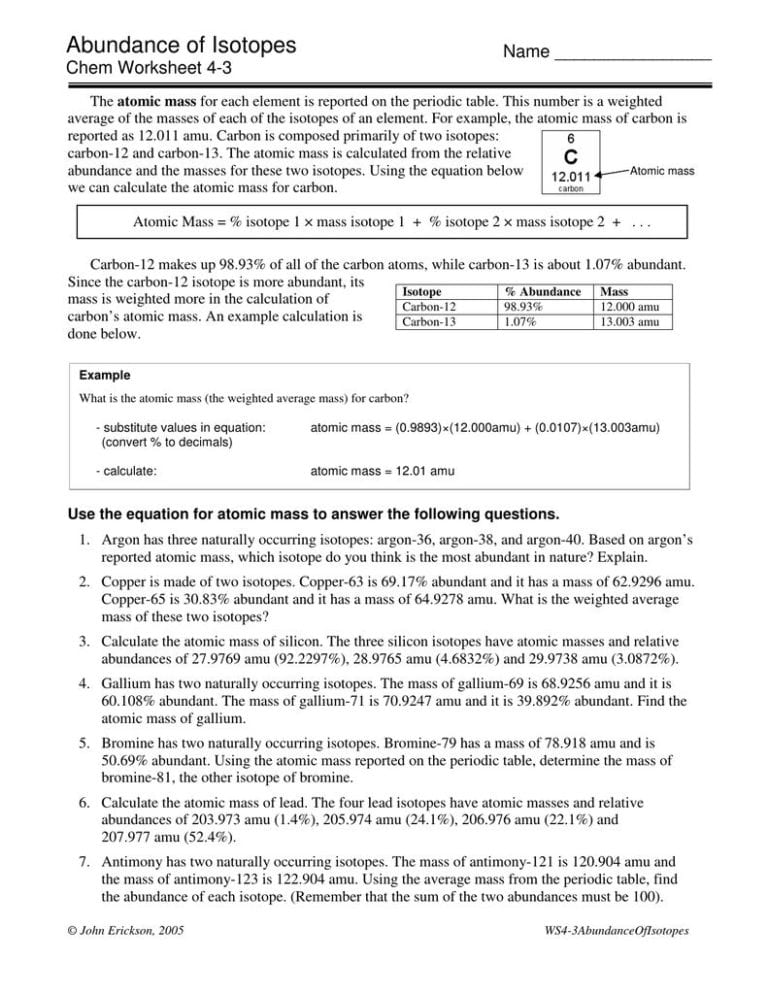Calculating Percent Abundance Of Isotopes Worksheet
Calculating Percent Abundance Of Isotopes Worksheet - If the average atomic mass of lutetium is 174.967 u, calculate its percent isotopic abundances. (2) complete the following table. Calculate the number of protons, neutrons and electrons in the 26mg+ ion. This number is a weighted average of the masses of each of the sotopes of an element. A comprehensive guide to mastering isotope calculations. The data below gives the m/z ratio and relative abundance of different isotopes of an element x.
Calculate the number of protons, neutrons and electrons in the 26mg+ ion. This worksheet focuses on calculating the percent abundance of. The element lutetium has two common isotopes: In a naturally occurring element, the fractional abundance is the percentage of the abundance of a particular isotope in the total sample of atoms, written as a decimal. Worksheet to help students calculate ram from relative abundances of isotopes.
In a naturally occurring element, the fractional abundance is the percentage of the abundance of a particular isotope in the total sample of atoms, written as a decimal. The data below gives the m/z ratio and relative abundance of different isotopes of an element x. Argon has three naturally occurring isotopes: This worksheet focuses on calculating the percent abundance of..
Use the equation in question 1 to calculate the atomic mass of an element that has two isotopes, each with 50.00% abundance. Antimony has two naturally occurring isotopes. The data below gives the m/z ratio and relative abundance of different isotopes of an element x. A scaffolded worksheet giving students practise in calculating relative atomic mass from masses of isotopes.
A comprehensive guide to mastering isotope calculations. The sample contained the three isotopes 24mg, 25mg and 26mg. Structured to start by thinking of balls in a box, through to simple calculation for copper. Practice calculating atomic mass using isotopic abundance. Antimony has two naturally occurring isotopes.
Antimony has two naturally occurring isotopes. Worksheet with example and problems for high school chemistry students. What are isotopes, protons, neutrons,. Calculating percent abundance of isotopes worksheet: The relative percentage abundances of 25mg and.
The element lutetium has two common isotopes: Calculating percent abundance of isotopes worksheet: Worksheet with example and problems for high school chemistry students. Calculate the number of protons, neutrons and electrons in the 26mg+ ion. One isotope has a mass of 63.00 amu and the other has a.
Calculating Percent Abundance Of Isotopes Worksheet - A comprehensive guide to mastering isotope calculations. Determine the relative atomic mass of the element x to 1 d.p. If the average atomic mass of lutetium is 174.967 u, calculate its percent isotopic abundances. If their relative isotopic masses and percentage abundances are 31.97 (95.0%), 32.97 (0.77%) and 33.97 (4.23%) respectively, determine the relative atomic mass of sulfur. What are isotopes, protons, neutrons,. Antimony has two naturally occurring isotopes.
The relative percentage abundances of 25mg and. This worksheet focuses on calculating the percent abundance of. What are isotopes, protons, neutrons,. Worksheet to help students calculate ram from relative abundances of isotopes. The element lutetium has two common isotopes:
In A Naturally Occurring Element, The Fractional Abundance Is The Percentage Of The Abundance Of A Particular Isotope In The Total Sample Of Atoms, Written As A Decimal.
Argon has three naturally occurring isotopes: If the average atomic mass of lutetium is 174.967 u, calculate its percent isotopic abundances. The data below gives the m/z ratio and relative abundance of different isotopes of an element x. The sample contained the three isotopes 24mg, 25mg and 26mg.
Using The Average Mass From The Periodic Table,.
Practice calculating atomic mass using isotopic abundance. Isotopes and mass spectrometry many elements have a number of isotopes. Antimony has two naturally occurring isotopes. (2) complete the following table.
One Isotope Has A Mass Of 63.00 Amu And The Other Has A.
The element lutetium has two common isotopes: A comprehensive guide to mastering isotope calculations. Using the equation below atomic mass we can calculate the atomic mass for carbon. Worksheet to help students calculate ram from relative abundances of isotopes.
Atomic Mass = % Isotope 1 × Mass Isotope 1 + % Isotope 2 × Mass Isotope 2 +.
Determine the relative atomic mass of the element x to 1 d.p. Suggest an identity for x. Using the average mass from the periodic table, calculate the abundance of each isotope. Worksheet with example and problems for high school chemistry students.




